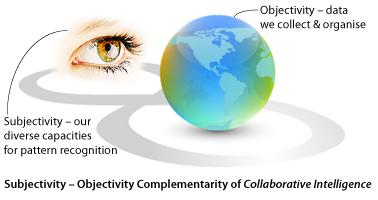
home | links | compass

Tower of Babel. 1928.
by M.C. Escher
Subjectivity–Objectivity
complementarity of
collaborative intelligence
Subjectivity – our diverse
POVs and interpretations
Objectivity – the facts of
the world we interpret
LINKS
References
von Ahn on Human
Computation
AI Conferences
Animating Time Data
Climate Collab
Darwin papers
EO Wilson Foundation
Gapminder
Geo-tagger's World Atlas
Gordon Lab
Innovation Networks
IRIDIA
Kelly - Hivemind
Kirschner Lab
London Open Street Map
Los Alamos – Symbiotic
Intelligence
Microbes–Mind Forum
MIT Center for
Collective Intelligence
Planet Innovation
Recommender Systems
SIGCHI
SIGEVO
SIGGRAPH
Turner Fieldwork
Vinge on Singularity
Wall Street Journal
BOOKS
![]()
Janis - Groupthink
![]()
Ehrlich - Humanity
on a Tightrope
![]()
Kelly – What
Technology Wants
![]()
Axelrod – Evolution
of Cooperation
![]()
Axelrod – Complexity
of Cooperation
![]()
Hansen, Schneiderman,
Smith – Analyzing Social
Networks - Node XL
![]()
J Fodor & M P
What Darwin Got Wrong
![]()
E Jablonka & M Lamb
Evolution in 4D
Cognitive Systems |
|
|
|
|
E.O. Wilson said, "We are drowning in information, while starving for wisdom. The world henceforth will be run by synthesizers, people able to put together the right information at the right time, think critically about it, and make choices wisely." The task ahead is to rise to that challenge. This page focuses on the foundational work of Irving Janis, which laid groundwork toward developing cognitive systems manifesting collaborative intelligence. Background. Irving Janis (1918-1990) was a pioneer who developed principles to guide the design of technology to support collaboration, before the technology existed to apply his findings. First as a professor of psychology at Yale University, later at UC Berkeley, Janis chose his case studies from the domain of public policy, conducting research on why committees often fail. He showed that a new method is needed to support cross-disciplinary, collaborative problem-solving. Groupthink — the risks of consensus-building Janis characterized “groupthink,” a term originally coined by urbanist William H. Whyte in 1952. Groupthink (one word, no hyphen) was the title of an article in Fortune Magazine in March 1952, in which Whyte wrote, “Groupthink is becoming a national philosophy. Groupthink being a coinage — and, admittedly, a loaded one — a working definition is in order. We are not talking about mere instinctive conformity — it is, after all, a perennial failing of mankind. What we are talking about is a rationalised conformity — an open, articulate philosophy which holds that group values are not only expedient but right and good as well.” Janis defined groupthink as “a mode of thinking that people engage in when they are deeply involved in a cohesive in-group, when the members’ strivings for unanimity [consensus] override their motivation to realistically appraise alternative courses of action.” Janis’ work on how teams fail, and his characterisation of lowest-common-denominator “groupthink,” illustrates the opposite principles from those that characterize collaborative intelligence. The flipside of Janis’ characterisation of how groupthink causes committees to fail, characterizes how effective cross-disciplinary teams optimise their performance, and how they can be supported to improve their success. In his case study of the Bay of Pigs fiasco, Janis asked how brilliant individuals, such as President John F. Kennedy, Arthur Schlesinger, and others, could have sat on a committee that designed such an inept strategy. What made this team of brilliant individuals sink to a lowest common denominator consensus — less intelligent than what any single individual on the team could have conceived working alone? Janis interviewed many on the committee, asking, “Were you personally in favor of the Bay of Pigs invasion?” He found that all were so busy that they failed to ask questions. Each assumed that someone else on the committee must be on top of this issue, so no one felt personally responsible to assess the plan critically. No one wanted to be the odd man out who spoiled the consensus. Everyone defaulted and just rode along. . . . Janis’ general findings are applicable, not only to public policy decisions like the Bay of Pigs, but also to design fiascoes, such as the design of the NASA Space Shuttle Challenger. Managers wanted to meet the January deadline set for the launch because they worried that delay would create a poor public image. Although engineers were hesitant about the behavior of the o-rings in frigid January weather, no one raised strong enough doubts to insist on postponing the launch. Ironically, delay would have created a far better public image than the crash of the Space Shuttle Challenger. Janis identifies five downsides of groupthink, all of which are exacerbated by pressure for consensus:
Several decades after his study these conditions were attributed to information overload and characterised as the information cascade problem: Each person takes his cue from others, so that at some point (an overload or complexity threshold) each individual stops paying attention to his own knowledge and starts watching and imitating others, a piggyback form of consensus. When an individual stops relying on his own knowledge, the information cascade is no longer informative. Everyone thinks that everyone else is making decisions based on what someone else knows. In fact each person is counting on someone else, or the collective wisdom, rather than on his own best judgment. This is when group collaborative intelligence plummets. Robert S. Baron, one of Janis’ critics, confirms the ongoing reputation and significance of Janis’ work in the quote he uses to start his critique: His abstract is followed by the quotation: “I come to bury Caesar, not to praise him.” Marc Anthony—Julius Caesar (Shakespeare). In choosing that quote, Baron conveys the stature of Janis and his reputation in this field. In Baron’s abstract he writes: “A review of the research and debate regarding Janis’s groupthink model leads to the conclusion that after some thirty years of investigation, the evidence has largely failed to support the formulation’s more ambitious and controversial predictions; specifically those linking certain antecedent conditions with groupthink phenomena. Moreover, research in the years since the theory’s inception indicates that most of the ‘groupthink’ phenomena described by Janis occur in a far wider range of group settings than he originally envisioned. Collectively, these data strongly suggest that Janis erred when identifying the necessary and sufficient antecedent conditions for groupthink. A ubiquity model of groupthink is introduced which specifies a revised set of antecedent conditions to explain why groupthink-like behavior occurs in mundane, temporary and even minimal groups and yet is not an invariant feature of group-decision-making.” Testing Janis’ hypothesis, as attempted by Baron, is necessarily arbitrary and influenced by the prejudices of the tester. Baron notes testing approaches used and collects citation literature since Janis’ publication, acknowledging that “the model has been widely cited (cf. Fuller & Aldag, 1998), and is still described as a valid model in most texts within social psychology (e.g. Baron & Byrne, 2003; Forsyth, 1999; Lord, 1997; Aronson, Wilson & Akert, 2003) and many introductory psychology texts as well (e.g., Myers, 2003).” Despite the author’s dramatic beginning, he concedes that Janis was right in his characterization of groupthink, though Baron argues that Janis was wrong in his listing of its testable antecedents. Baron concedes that “if a group of autonomous individuals tries to solve a problem without any means of putting their judgments together, then the best solution they can hope for is the solution that the smartest person in the group produces,” which is not guaranteed. Baron, R. S. 2005. So Right It's Wrong: Groupthink and the Ubiquitous Nature of Polarized Group Decision Making. In Zanna, Mark P (Ed.) Advances in experimental social psychology, Vol. 37. (219-253). San Diego. Elsevier Academic Press Baron, Robert and Norbert Kerr. 2003. Second Edition. Group Process, Group Decision, Group Action. Philadelphia, PA: Open University Press. Janis, Irving L. 1982. Groupthink: Psychological studies of policy decisions and fiascos. 2nd ed., Boston: Houghton Mifflin. Report of the Presidential Commission on the Space Shuttle Challenger Accident. February 3, 1986. http://science.ksc.nasa.gov/shuttle/missions/51-l/docs/rogers-commission/table-of-contents.html Retrieved January 22, 2010. Surowiecki, James. 2004. The Wisdom of Crowds: Why the Many Are Smarter Than the Few and How Collective Wisdom Shapes Business, Economies, Societies and Nations. Boston: Little, Brown ISBN 0-316-86173-1 105. |
|
|
|
